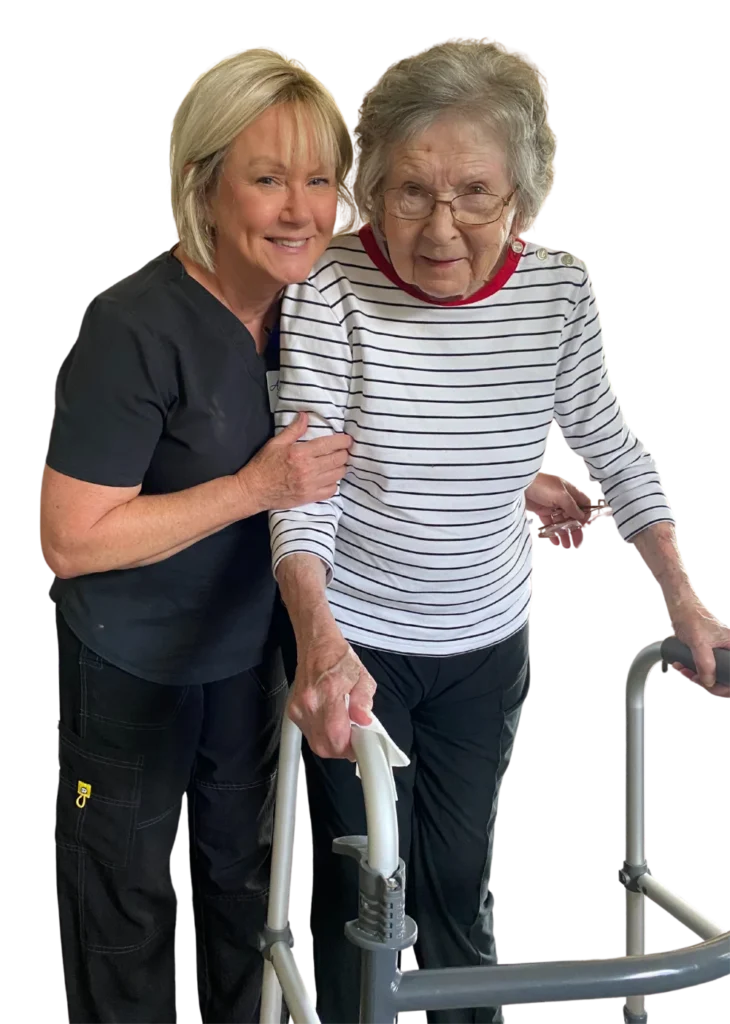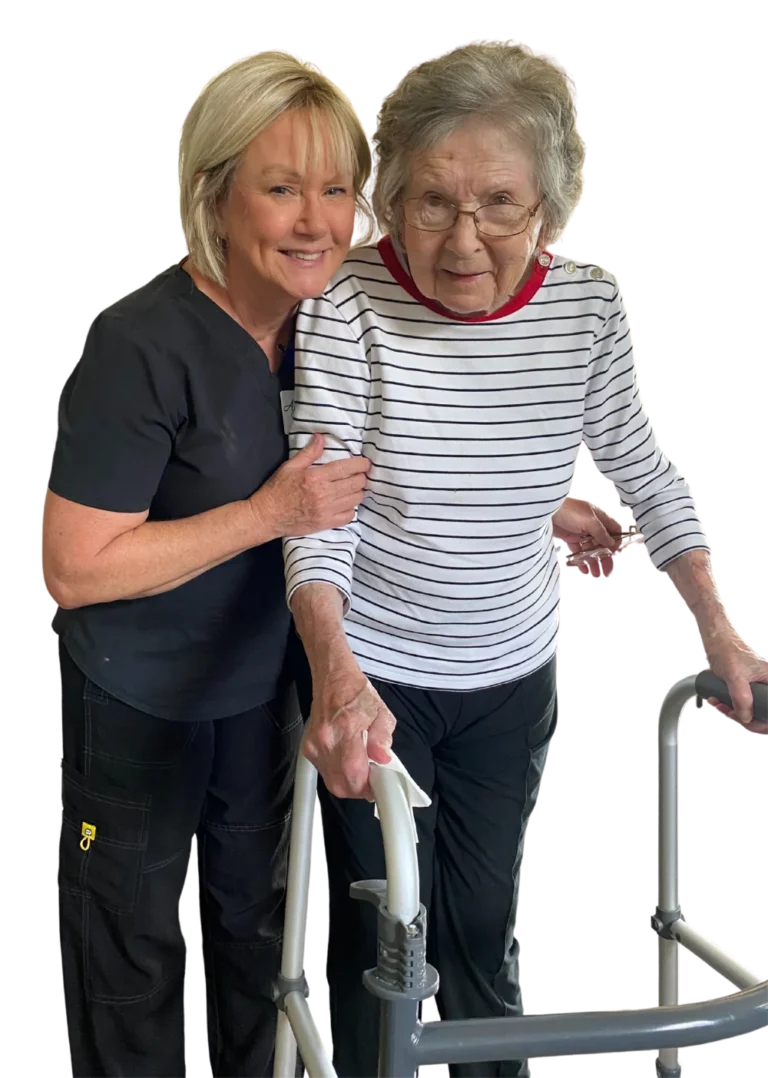Frequently Asked Questions
How does in home care differ from nursing homes?
In-home care differs from nursing homes in that it provides personalized, one-on-one support in the comfort of the senior's own home, while nursing homes offer communal living with more intensive medical care and supervision.
What services are included in in home care?
In-home care services include personal care, companionship, respite care, and transportation, all tailored to meet the unique needs of seniors, ensuring they can age in place comfortably and safely.
What services do senior caregivers typically provide?
Senior caregivers typically provide a range of services, including personal care, companionship, respite care, and transportation, all tailored to meet the individual needs of seniors aging in place.
What types of caregivers provide home care services?
The types of caregivers that provide home care services include personal care aides, certified nursing assistants (CNAs), and home health aides. Each caregiver specializes in different aspects of care to meet the unique needs of seniors.
How do I find a reliable in home care provider?
Finding a reliable in-home care provider involves researching agencies, reading reviews, and checking credentials. It's essential to interview potential providers and discuss your specific needs to ensure they offer personalized, compassionate care.
What are the benefits of in-home senior care?
The benefits of in-home senior care include personalized support tailored to individual needs, the comfort of receiving care in a familiar environment, enhanced safety, and opportunities for companionship, all of which promote overall well-being and independence for seniors.
What are the benefits of home care services for elderly people?
The benefits of home care services for elderly people include personalized support, enhanced safety, and the comfort of receiving care in familiar surroundings, which can significantly improve their quality of life and promote independence.
What is the role of home care services in preventing hospital readmissions?
The role of home care services in preventing hospital readmissions is significant. They provide personalized support, medication management, and regular health monitoring, ensuring seniors receive the care they need at home, which reduces the likelihood of complications that lead to hospital visits.
What is the average cost of in home care per hour?
The average cost of in-home care per hour typically ranges from $20 to $40, depending on the level of care required and the specific services provided.
Can home care services be covered by insurance plans?
Home care services can often be covered by insurance plans, including Medicare and Medicaid, depending on the specific services required and individual eligibility. It's best to consult with your insurance provider for detailed coverage information.
How do I choose the right senior care provider for my loved one?
Choosing the right senior care provider for your loved one involves evaluating their specific needs, researching local agencies, and assessing their services, reputation, and personalized care plans to ensure a comfortable and safe aging experience.
Are senior care services covered by Medicare or Medicaid?
Senior care services may be partially covered by Medicare and Medicaid, but coverage varies based on specific services and individual eligibility. It's essential to check with your provider for detailed information on what is included.
How do I find a trustworthy senior care provider?
Finding a trustworthy senior care provider involves researching agencies, reading reviews, checking credentials, and scheduling consultations to discuss personalized care options and ensure they align with your loved one's needs.
How much does in home care typically cost?
The cost of in-home care typically varies based on services needed and location. On average, families can expect to pay between $20 to $40 per hour for personalized care in Wilmington, NC.
Can home care services be customized to individual needs?
Home care services can be customized to individual needs. At Age In Place Home Care Services, we create personalized care plans that cater to each senior's unique preferences and requirements, ensuring they receive the support they need to thrive at home.
How do home care services promote healthy aging?
Home care services promote healthy aging by providing personalized support that enhances seniors' physical, emotional, and social well-being. This includes assistance with daily activities, companionship, and tailored care plans that foster independence and safety in their own homes.
How do home care services support independent living?
Home care services support independent living by providing personalized assistance with daily activities, ensuring safety, and offering companionship. This tailored support enables seniors to maintain their autonomy while receiving the care they need in the comfort of their own homes.
What is the cost of home care services compared to nursing homes?
The cost of home care services is generally lower than that of nursing homes. Home care allows seniors to receive personalized assistance in the comfort of their own homes, often resulting in significant savings compared to the expenses associated with residential care facilities.
Can in home care provide assistance with daily tasks?
In-home care can provide valuable assistance with daily tasks. Our caregivers help seniors with activities such as bathing, dressing, meal preparation, and light housekeeping, ensuring they can maintain their independence and comfort at home.
How do home care services improve mental health outcomes?
Home care services improve mental health outcomes by providing personalized support, companionship, and a stable environment, which helps reduce feelings of isolation and anxiety in seniors, ultimately enhancing their overall well-being and quality of life.
What types of senior care services are available in my area?
The types of senior care services available in your area include personal care, respite care, companionship, and transportation, all tailored to meet the unique needs of seniors aging in place comfortably.
Can senior care services help with daily living tasks?
Senior care services can significantly assist with daily living tasks. They provide personalized support for activities such as bathing, dressing, meal preparation, and medication management, ensuring seniors can maintain their independence and comfort in their own homes.
What are the costs of senior care services?
The costs of senior care services vary based on the level of care required and the specific services provided. At Age In Place Home Care Services, we offer personalized care plans to fit different budgets and needs.
How do I know if my loved one needs senior care?
Determining if your loved one needs senior care involves observing changes in their daily activities, health, and safety. Signs may include difficulty with personal hygiene, managing medications, or handling household tasks.
What is the difference between home care and assisted living?
The difference between home care and assisted living lies in the level of support provided. Home care offers personalized assistance in the comfort of one's own home, while assisted living provides a communal living environment with 24/7 care and supervision.
Can in home care be customized to individual needs?
In-home care can be customized to individual needs. At Age In Place Home Care Services, we create personalized care plans that cater specifically to each senior's unique requirements, ensuring they receive the support and comfort they deserve.
Do in home care providers offer 24/7 support?
In-home care providers can offer 24/7 support based on individual client needs. Services may include round-the-clock assistance, ensuring that seniors receive care and companionship whenever required.
How do home care services support people with disabilities?
Home care services support people with disabilities by offering personalized assistance tailored to their specific needs, including help with daily activities, companionship, and access to transportation, enabling them to live independently and comfortably in their own homes.
Are in home caregivers trained and certified?
In-home caregivers are trained and certified professionals. They undergo specific training programs to ensure they provide high-quality care tailored to the needs of seniors, prioritizing safety and well-being.
What are the benefits of in home care for seniors?
The benefits of in-home care for seniors include personalized support tailored to individual needs, enhanced comfort in familiar surroundings, improved safety, and companionship, all of which contribute to a higher quality of life as they age in place.







